As America moves towards more restrictive borders, Singaporeans reassess travel, study and business plans to the US
President Donald Trump's "America First" rhetoric and policies, which have affected trade and led to more restrictive immigration policies, have dented the United States' reputation that was held up in part by the country's prestigious top universities and cutting-edge firms.
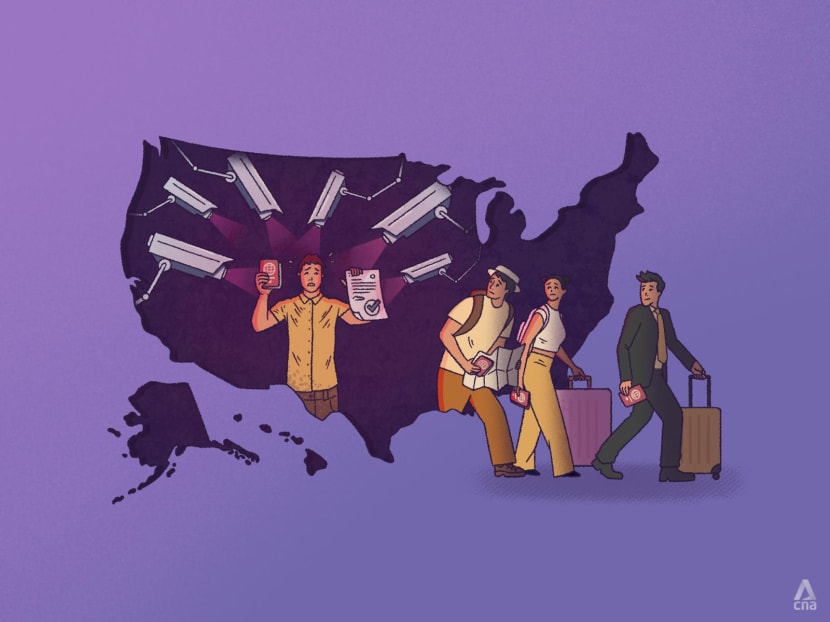
As students, professionals, would-be migrants and even tourists contend with a more uncertain America under Trump 2.0, some are questioning how welcoming the country is and whether its long-held appeal is starting to fade. (Illustration: CNA/Nurjannah Suhaimi)

This audio is generated by an AI tool.
Singaporean student Robert (not his real name) never imagined that pursuing a degree at Harvard would entail joining a Signal chat group to monitor the movements of officers from the United States Immigration and Customs Enforcement (ICE) on campus.
Nor did he imagine that on Thursday (May 22), US President Donald Trump would make good on his threat to block the university from enrolling international students, after accusing the school of "fostering violence, antisemitism, and coordinating with the Chinese Communist Party on its campus".
This move is set to force existing Harvard students to transfer to other schools or lose their legal status in the US. The Trump administration has also threatened to expand the crackdown to other schools.
Mr Robert said: "I found out through a New York Times news notification on my phone. There’s a lot of frustration and confusion, especially because the termination is said to be effective immediately, so it’s not clear if students have begun to accrue unlawful status."
Harvard is one of the Ivy League universities hardest hit by funding cuts to higher education and immigration crackdowns across universities as Mr Trump moves swiftly to reshape both US universities and education during his second term in office, casting a pall on the international student community.
In response to Mr Trump’s latest moves against the university, Harvard sued the Trump administration on Friday and called the revocation of the school's ability to enrol international students a "blatant violation" of the US Constitution and other federal laws.
Mr Robert, who is in his 20s, asked that his name not be published because he feared it could affect his future visa applications to the US.
He was one of many Singaporean students and professionals who spoke to CNA TODAY for this article. Some declined to comment while others spoke on condition of anonymity, wary of being flagged by the immigration authorities known to monitor online activity.
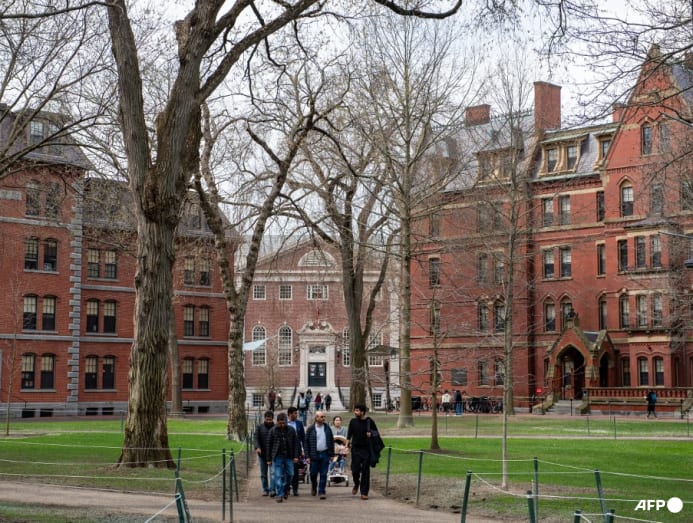
In the first 100 days since Mr Trump began his second term on Jan 20, more than 4,700 international students across various universities had their legal status records in the Student and Exchange Visitor Information System (SEVIS) terminated abruptly.
Although his administration restored the terminated legal statuses of international students in April, for many people, this episode and Mr Trump's latest move against Harvard symbolise a shift in how welcoming the US feels towards foreigners, even those from Singapore, which has long enjoyed strong ties with the superpower.
Mr Robert said: “If you had asked me two months ago, I would have said the strength of the Singapore passport shields me.
“What changed my impression was that Harvard was targeted en masse, including revoking the school’s ability to host international students. My Singaporean passport was not going to shield me from that happening.”
Mr Robert noted that the trajectory of Mr Trump’s policies – such as the immigration crackdown and federal funding freeze or deep cuts for universities including elite Ivy League institutions such as Princeton and Cornell – suggests that Singaporean students looking to study in the US should be cautious.
“I did have a feeling that Trump was going to win. I didn’t expect it to be like this – the speed at which some of this happened or the magnitude of his attacks on higher education," he said.
Apart from shaking up the US education landscape, Mr Trump has also rattled both the US and global economies with tariff policies that have worsened the US-China trade war. Although both countries have now agreed to a 90-day trade ceasefire, economic uncertainty remains.
Since moving to the US state of Texas in January, Ms Janani Chandran, 42, has seen prices for some imported Asian noodle products rise from US$3.50 to US$4.20 (S$4.50 to S$5.40), which she attributed to the tariffs the Trump administration has imposed on most of its trading partners.
“(The rise in prices is) in terms of cents right now, but when you compound it over a year, you will see a big difference,” Ms Chandran said. She works in technical programme management.
Prospective students and travellers to the US also told CNA TODAY about disrupted plans to work or study there, as well as a shift in mindset towards travelling to the country, pointing to safety concerns and attractive alternatives in Europe and Australia.
One global body representing the travel and tourism private sector, the World Travel and Tourism Council, predicted that the US is on track to lose US$12.5 billion in international visitor spending this year, in part due to the US government “putting up the ‘closed’ sign” while other countries are rolling out the welcome mat to visitors.
For decades, the US has held a strong allure for Singaporeans with its top universities, global companies, iconic tourist destinations and vast business opportunities.
However, as students, professionals, would-be migrants and even tourists contend with a more uncertain America under Trump 2.0, some are questioning how welcoming the country is and whether its long-held appeal is starting to fade.
“CLOUD OF UNCERTAINTY”
While tariff wars have hogged the headlines in recent months, Singaporeans studying and working in the US said that other changes under the Trump administration have hit closer to home.
Mr Chan Choon Yong, a 24-year-old student pursuing a master's degree in engineering at the University of California Los Angeles (UCLA), said the sudden withdrawal of government research funding from universities has left many students anxious about their stipends and allowances.
International students have also been warned by their school administrations to remain vigilant since visa rules may change abruptly.
“Trump's 'America First' policy starkly reminds us that as Singaporeans studying and working in the US, we're essentially second-class citizens compared to Americans,” Mr Chan added.
At Northwestern University, journalism and American studies undergraduate Gabrielle (not her real name) said that sponsored field trips to various US cities – a “core selling point” of her degree – are being slashed after the school’s federal funding was frozen amid investigations into allegations of anti-Semitism on campus.
“Everybody is definitely on high alert, in every single class we talk about this.”
Besides funding cuts, US officials’ threats to deport “lunatics” from college campuses, as well as anti-immigration rhetoric, have led to a heightened sense of scrutiny for Singaporeans living in the US.
Mr Solihin Samsuri, 29, a Southeast Asian Studies student at the University of California, Berkeley, said that in March, international students were actively discouraged by the university from leaving the country to prevent any difficulties re-entering the US.
In an updated travel advisory in April, the Berkeley International Office said on its website that international travel may be “high risk for all clients” due to strict vetting and enforcement.
Upon returning from a trip to Mexico in March, Mr Solihin said he was pulled aside to a secondary lane at San Francisco International Airport for screening and was asked whether he would be trying to get a job in the US after his student visa expires in 2029.
“The climate is definitely worse. It’s not just like previously, where vaguely brown or Muslim folk (might be scrutinised), but there are tangible cases now, where international students or even American citizens are getting pulled aside,” Mr Solihin added.
He also said the university could not guarantee that it would be able to extricate or help students in a “material way”. “There's just a general cloud of uncertainty.”
However, the unpredictability has not discouraged many international students on his campus from returning home for the ongoing summer holidays.
Mr Solihin said: “The feeling is, like, bobian (Hokkien for "no choice"). What are you going to do? Not go home?”
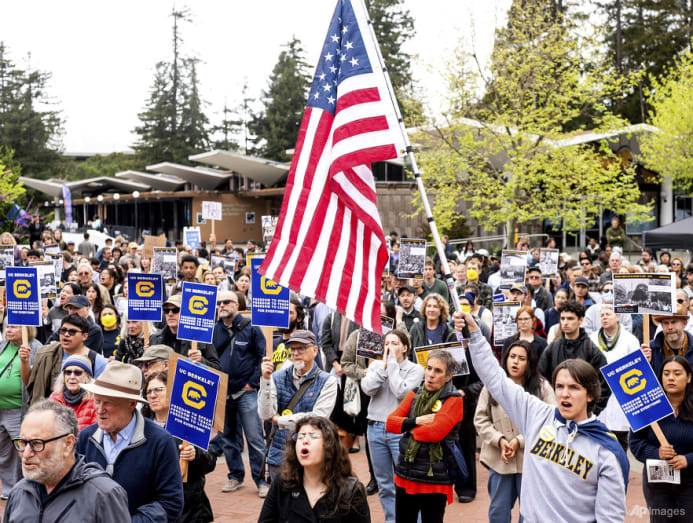
Software engineer Jonathan (not his real name), who studied in the US and began full-time work there in 2021, said he now has a “psychological fear” of being denied re-entry to the country.
When in the US, Mr Jonathan, who is in his 30s, makes it a point to carry his visa documents in his wallet every day. He plans to travel to Singapore in July and will wipe out his WhatsApp chats before re-entering the US, because he is a “bit paranoid” about what information the immigration authorities might be able to access.
Over at Yale University, Mr Lim Zhen Jun, 30, a graduate student in social sciences, expressed concerns about surveillance, especially on social media. He acknowledged that Singaporeans have generally had smoother experiences with visas compared with his peers from other countries, but recent developments have shifted his outlook.
"In the past semester, I thought being Singaporean might make immigration smoother, especially given the strength of our passport. But with the new changes affecting all international students, that no longer seems to be the case.”
Although Mr Lim is less concerned for his personal safety, having lived in the US for a decade and with plans to complete his studies remotely in Singapore, he has seen a growing unease among his peers.
He said: “When ICE was on campus, everyone was chatting about avoiding this area. There is a tangible sense of fear and anxiety that has heightened, which does change people’s plans for their own research.”
CNA TODAY contacted the eight Ivy League schools in the US for comment regarding changes in Singaporean students' enrolment interest in their programmes, and how the schools are supporting international students in the midst of the changes announced by the Trump administration.
Cornell University said that its international services team regularly monitors SEVIS data and evolving US immigration and travel policies, and it proactively contacts students if any visa concerns arise.
The university’s legal and immigration experts have also hosted webinars to address students' questions about visa challenges and travel restrictions.
“Specifically, we have issued travel advisories informing students that international travel carries risks due to evolving federal restrictions, which may affect re-entry. Additionally, the university provides resources on digital privacy at borders to help travellers assess potential risks and protect their information,” the university added.
In response to CNA TODAY’s queries, the US embassy in Singapore said that it regularly provides Singaporean students, parents and educators with up-to-date information on universities, the application process and the student visa process.
In the latest Open Doors report, which tracks international student enrolment in the US, 4,574 Singaporean students were said to be studying in the US as of 2024, the highest per capita in Southeast Asia, the embassy noted.
The US Embassy in Singapore did not respond to queries on how the 2024 figures compared to those in the past years.
However, Open Doors data showed a relatively steady number of Singaporean students – around 4,400 to 4,600 – attending US universities in the past five years, aside from a dip during the COVID-19 pandemic.
“Driven by a desire to attend premier educational institutions at the cutting edge of innovation and research, more Singaporean students have continued to enrol at US universities in recent years.
“US colleges and universities remain committed to welcoming international students and ensuring their well-being, academic success and integration into campus life by offering comprehensive support services,” the US embassy here said.
The British Council in Singapore, the United Kingdom's international organisation for cultural relations and educational opportunities, told CNA TODAY that around 6,500 to 7,000 Singaporean students study in the UK each year.
Of Singapore residents who head to the major English-speaking destination countries for studies, around 40 per cent chose the UK, with Australia following in second place and the US coming in third, based on 2022 data, the British Council said.
Meanwhile, the Singapore Management University said application numbers for its exchange programmes with US partner universities have remained stable. The university has partnerships with several US institutions, including New York University and the University of North Carolina at Chapel Hill.
In response to CNA TODAY's queries, the Australian Department of Home Affairs said "lodgement trends have remained consistent" with expected seasonal peaks and troughs, with no noticeable shift in Electronic Travel Authority applications for Singapore citizens.
"The international education sector is important to Australia, and the Australian government is committed to ensuring its equality, quality, integrity and sustainability," it added.
LOOKING ELSEWHERE OR "WAIT AND SEE"
While those already in the US may have little choice but to adapt to policy changes, Singaporeans back home are starting to reconsider whether to go there at all.
For Mr Rayan (not his real name), the current concerns surrounding US immigration policy, along with Harvard's battle with the Trump administration, led him to turn down an offer to pursue postgraduate studies at Harvard.
“With these two uncertainties combined, it is not worth taking the mental, emotional, financial and, possibly, physical toll or risk to study in the US,” he said. Mr Rayan, who is in his 30s, now plans to pursue postgraduate studies at a leading European university.
Although Harvard had been his top choice, news of detained tourists from Australia, Canada and Germany – despite them having valid visas – added to what he described as a “cloud of wariness” about moving to the US.
For 17-year-old Cheah Sheng Xin, a first-year junior college student and scholar with university admissions consultancy Crimson Education, the shifting landscape for international students in the US has also given her pause.
She began reassessing her ambition to pursue studies in the US when the US Department of Homeland Security threatened to revoke Harvard’s ability to host international students. Her uncertainty has only become concrete with the latest news of Mr Trump acting on that threat.
“While I know there are ongoing negotiations and attempts to stabilise things, the idea that laws can change suddenly is unsettling. It makes me wonder how secure my place would be if I were to study there,” the teenager said.
Having said that, her "cautious optimism" that institutions such as Harvard would continue to work through such challenges and remain committed to international students still makes her view the US as a "world-class destination for higher education", she added.
Though still open to applying to US universities with strong biotechnology programmes, she is also exploring options in the UK – such as Oxford or University College London – and at institutions here such as the National University of Singapore.
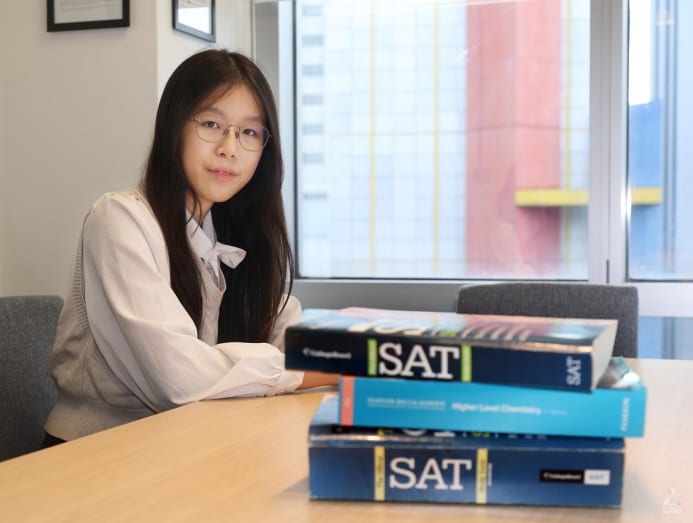
Even for those who still view the US as an attractive destination for further studies, Mr Trump’s policies have thrown a spanner in the works.
Ms Riya (not her real name), 29, was all set to begin a master's in international relations at Syracuse University, in partnership with a leading think tank in Washington DC. She had also made plans to work at the US branch of her current employer in the media industry while completing her studies.
However, just three months after she received her acceptance letter, the university began facing funding cuts and her programme is now among those scheduled to shut down next year.
If she were to proceed with her plans, Ms Riya would have had to complete her degree on a condensed schedule, including completing some courses online and forgoing the possibility of working while studying.
She eventually decided to withdraw from the programme and has put her further education plans on hold for now.
“It’s been a rollercoaster. Your emotions mirror the pace of the news. One moment you’re really excited, you’re making plans for the World Cup next year in the US and then suddenly, it’s ... hold on, is it even worth it?”
For Ms Abigail (not her real name), who is in her 20s and studying at Johns Hopkins University, recent US government policies have prompted her to rethink where she might launch her career.
“Around the time I applied in 2020 (to get into universities), I remember my parents saying, ‘If Trump wins, let’s consider other countries’. But he didn’t win that one,” Ms Abigail said, referring to the 2020 presidential election won by Mr Joe Biden.
Now halfway through her degree, transferring to another school is no longer a practical option.
At the moment, Ms Abigail feels safe as an international student as long as she “lies low and is not out there protesting”, though she no longer solely prioritises post-graduation opportunities in the US.
“If I want to get back (to Singapore) and … it’s becoming more likely, then I want to start building experience and a network in Singapore,” she said, on why she returned here this summer for an internship in a consulting firm.
The shifting perceptions of the US are not confined to those considering long-term stays there, with some Singaporean tourists choosing not to visit due to growing concerns over immigration crackdowns.
Ms Lu, a 25-year-old public relations executive who usually travels to the US twice a year to visit her American partner, has now put off her annual summer trip.
“The news of the US deporting people of colour, even those who are legally residing there, without due process is quite scary. Many European countries like France and Germany, which are supposed to be allied with the US, have also issued travel warnings, so it is definitely concerning,” she said.
“I am hoping things settle down so that I can visit soon, otherwise I might just wait until Trump completes his term.
"I know our Singaporean passport is very strong and we have good diplomatic relations with the US, but I’m an anxious traveller and prefer not to do anything risky,” Ms Lu added.
Last December, when Mr Er Chow Kiat, managing director of drum school Drum Tutor, announced a June holiday summer music camp in Los Angeles, initial interest was strong.
Then, by February, just weeks after Mr Trump was sworn in as president, sign-ups dropped by about 50 per cent as parents grew uneasy about letting their children go to the US.
“We had parents that were quite concerned about the immigration situation and they asked for official letters and immigration letters from the school that we will be visiting, which were provided,” Mr Er recalled.
To reassure parents, the US-based music school hosting the camp issued an invitation letter stating the names of students attending, the camp’s location and the purpose of their visit.
One parent, Mr Titus Shu, 42, who works in manufacturing, will be in the US for a business trip in June, but he plans to fly back to Singapore and then return to the US with his son to accompany him to the music camp and ensure a smooth passage through immigration.
Mr Er, who also runs Mobius Music, an electronic drum-kit manufacturer that makes its products in China and exports to the US, is seeing a broader impact from Mr Trump’s economic policies and has had to delay the launch of a new product due to uncertainty surrounding tariffs.
Like many businesses, he is adopting a “wait and see” approach, hoping for greater clarity once the 90-day pause in the US-China tariff war ends in August.
For now, Mr Er has no plans to leave the US market.
“Music instrument companies till today have continued to work with various US artistes to drive marketing and sales. The US remains a country with great innovation and strong consumer consumption, therefore it might be unwise and even costly to overlook the US market,” he said.
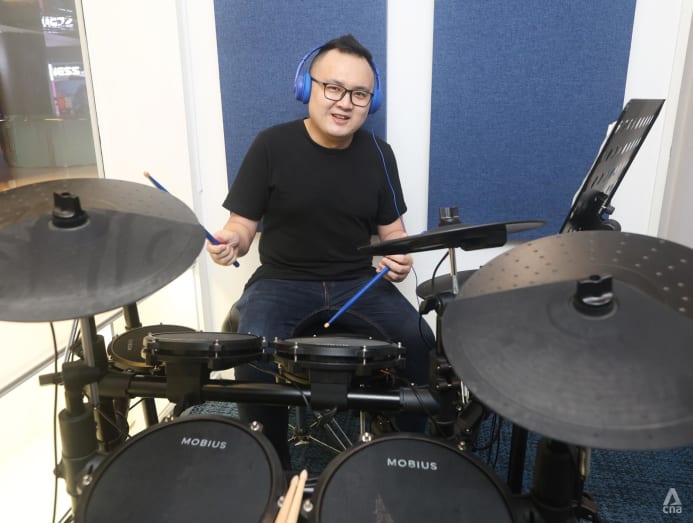
Mr TK Khor, director of manufacturers’ representative firm Outsource Asia Industries, is also adopting a cautious stance by limiting exports from China to the US to one container a month to maintain stock levels for clients.
“It’s all very dynamic. We cannot (yet) make the business decision whether to relocate (out of China) or to stay.”
Mr Khor's company makes fall prevention products such as guardrails and anchors for the US construction industry. Despite the headwinds, he remains committed to the US market, where his firm has had a presence since 2000.
“The US is still the single biggest market in the world,” he said. “We will continue to sell into the US if we are able to do so.”
CHANGING OR CHANGED AMERICA?
Singapore businesses still see the US as a land of opportunity, but many are recalibrating how they engage with it given the growing geopolitical uncertainty.
Analysts said these adjustments reflect not just short-term reactions to the Trump administration, but a deeper reassessment of the US’ long-standing role in the global order.
Dr Lei Hsien-Hsien, chief executive officer of the American Chamber of Commerce in Singapore, said that where business decisions once hinged on cost and market potential, companies now factor in geopolitics in their risk assessment.
However, that is not a strategy necessarily linked to one administration. Dr Lei pointed out that trade policies from Mr Trump’s first term, including tariffs, remained intact under the Biden administration, suggesting that what the current US president is doing may not differ greatly from his predecessors or potential successors.
“Previously, I think some people kind of thought, ‘It’ll blow over or it’ll be short term’. Now, I think people are more inclined to say, ‘We need to come up with more of a strategic plan in the mid to long term’,” Dr Lei said.
Mr Ang Yuit, president of the Association of Small and Medium Enterprises, said that evolving US trade policies have led some Singapore businesses – even those not directly affected by Mr Trump’s tariffs – to delay major investment, purchasing or hiring decisions.
Beyond staying agile in the short term, he urged small- and medium-sized enterprises to prepare for structural shifts in the global trade and economic order.
“In the medium to long term, we must go beyond the US. The US is too volatile, too unpredictable,” Mr Ang added.
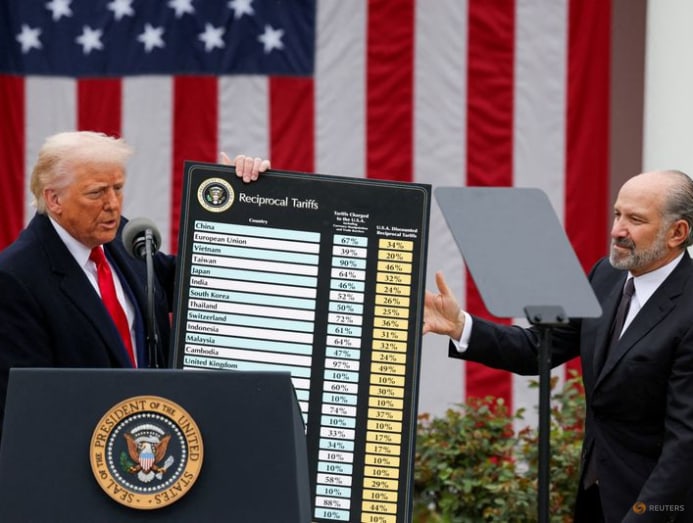
Analysts also noted that rising political polarisation and anti-globalisation sentiments have complicated the US’ standing as a stable destination for education, work and investment.
Dr Pan Zhengqi, a senior lecturer in business at the Singapore University of Social Sciences (SUSS), said: “America’s appeal has long stemmed from its openness to talent, diversity of thought and its deep-rooted tradition of academic freedom. However, these qualities are increasingly uncertain.”
He cited the examples of Mr Trump’s restrictive immigration policies and threats to defund universities perceived as politically liberal that compound global perceptions of the US turning inward and more unpredictable.
Some people may be hoping that America’s image might “reset” once Mr Trump leaves office, but Dr Pan said “deeper undercurrents” – such as economic insecurity, scepticism towards globalisation and cultural conservatism in the US – made his rise possible and will likely outlast the US president.
Should the US be seen as too volatile or unsafe, more Singaporeans may increasingly look to alternatives in Europe, Canada or Asia. Regional hubs are also becoming more viable as remote work and hybrid study options gain traction, he noted.
“These shifts don’t necessarily mean disengagement from the US altogether, but they do suggest a diversification of options and a weakening of the US’ once near-unquestioned primacy in global business and tertiary education,” Dr Pan added.
Commenting on this, Dr Mustafa Izzuddin, a senior international affairs analyst with business consultancy Solaris Strategies Singapore, is of the view that the US remains attractive to many Singaporeans, especially for its entrepreneurial economy.
Mr Trump’s actions may dent the US brand in the short term, but this is unlikely to mark the end of its global cultural influence, Dr Mustafa said, though there is now more competition from other countries where Singaporeans may travel to work and study.
“I think (it won’t be) a long-term impact, but certainly in the short term, there'll be a rethinking on whether the US would be a destination or if they want to look at alternatives.”
Dr Mustafa also said that some people may choose to steer away from the US for personal or political reasons. For instance, as a show of solidarity with the Palestinian cause, or because niche study courses are also offered elsewhere.
Mr Jamie Beaton, co-founder and CEO of Crimson Education, said interest in American universities remains steady, though a small number of Singaporean families have raised concerns about student visas and the potential for revocation.
“Even when we clarify that these cases have not affected students from Singapore and are unlikely to, it can still influence the decision-making process for those who were already uncertain,” Mr Beaton added.
Some of these families are thus prioritising the UK for undergraduate studies, with the possibility of considering the US for postgraduate education, he observed.
Overall, the US still dominates interest among Crimson’s Singapore-based students, though more are “rationally diversifying” their applications to include Australian, European and UK schools, especially as global admissions grow more competitive.
Speaking to CNA TODAY before Harvard’s latest move to sue the Trump administration, Mr Beaton said: "At this stage, it's still very early, but based on precedent and Harvard’s response so far, we fully expect Harvard to mount a swift and serious legal challenge, and to win."
In conversations with his students, Dr Mark Cenite, an associate dean of undergraduate education at Nanyang Technological University, said that there is a “fair amount of nuance” in how the Trump administration has an impact on young people's views of the US.
Dr Cenite, who teaches media law and artificial intelligence law at the Wee Kim Wee School of Communication and Information, said that many Singaporean students follow American social media influencers and would see that although Trump dominates news headlines, he does not similarly dominate other aspects of American daily life.
He added: “Trump has not yet become synonymous with America in my students’ eyes. Students are as familiar with Trump’s American critics as they are with Trump’s words and actions.”
STILL THE DREAM DESTINATION
It may well be too soon to say if Mr Trump’s actions and the volatile climate have affected US university enrolments from Singapore, given that public statistics are tallied yearly and enrolment numbers for the incoming cohort are not yet publicly available.
Yet while the ripple effects of Mr Trump’s policies and shifting global sentiment towards the US may mean that America’s cultural dominance is not the same as it once was, Singaporean students and professionals said the country still holds a strong appeal.
For 27-year-old creative agency founder Jodi Tang, the US once symbolised a key stepping stone in global education and professional growth.
“The challenges of securing visas, coupled with a more nationalistic climate, have made it harder for international talent to see the US as a straightforward, welcoming place to build a career or pursue higher education,” she said.
Still, Ms Tang said that Singaporeans who are adaptable and prepared to embrace different cultural norms, including a more diverse society with a greater sense of individualism, are likely to succeed.
During her recent travels to the US in May, she had a smooth immigration experience despite her expectations of a “more intense” process. She also noticed more “positive views” towards Singapore.
“People often express high praise for Singapore and I’ve observed that the ongoing tariffs have influenced public opinion. Instead of reinforcing negative views of China, the criticism seems directed more at the Trump administration’s policies,” Ms Tang added.
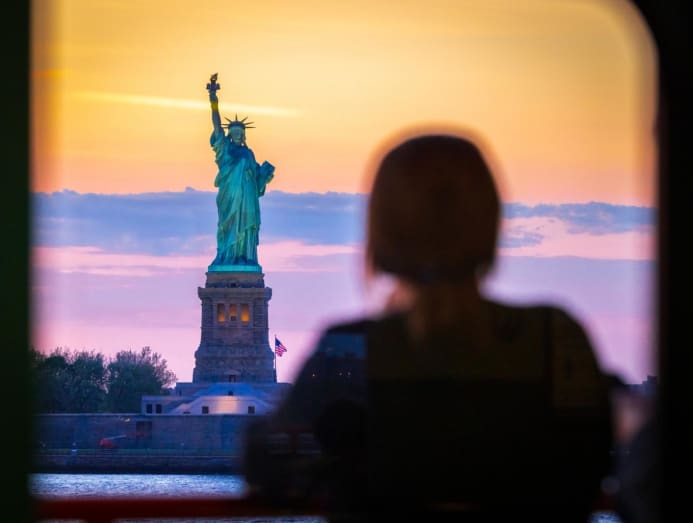
Others agreed that America’s appeal, especially in the fields of education and technology, still endures, though an air of caution lingers.
Mr Anthony Fong, a 28-year-old software engineer who has lived in New York City for the past three years, said that the US is still one of the best places to be, especially for those looking to work in the financial or technology sectors.
“I’m not looking to move anytime soon. Monetary compensation is top tier in the US and cutting-edge work is usually done there,” he reasoned.
Mr Lim, the graduate student at Yale, said that many still view elite American universities as gateways to global networks that could be helpful in one's future career.
"Many of the reasons why people go to these schools are the social experiences, the alumni network.”
These plus points will not "disappear overnight", though Mr Lim noted that the Trump administration's recent actions such as the cancellation of Harvard's SEVP certification and moves to raise the tax on university endowments pose real threats to the competitiveness of the US higher education landscape.
“As these shifts unfold in real time, there’s growing uncertainty. With Harvard in the crosshairs, could Yale and other universities be next? And what should we do to prepare?"
At UCLA, undergraduate student Shawn (not his real name) said that the scrutiny of international students may have increased since Mr Trump’s election, but daily life on campus remains relatively unchanged.
The general feeling among students is that things remain more or less status quo as long as one does not rock the boat, the student in his 20s said.
For him, the shine of studying in the US has not dulled either – being exposed to different styles of learning has been “eye-opening”, allowing him to pick up more creative styles of writing rather than being “fixated on getting an A”.
He continued: “The US is currently a powerhouse of the world. That tension between different countries is still going to be there, I don’t think it’s going to disappear anytime soon.
"I disagree with whether there’s a good or bad time to go to the US. It’s more about your personal beliefs and values.”
Mr Shawn acknowledged, however, that one's experience will likely be dependent on the higher education institution in the US where one is aiming to go.
He said, for example, of how Columbia University has acquiesced to most of the Trump administration's demands in a bid to restore funding, in stark contrast to Harvard, which has publicly spoken out against and legally challenged the Trump administration.
The Northwestern University student who wanted to be known as Gabrielle said that she is "not that worried" about recent developments given that her university has ceded to Mr Trump's demands in the past, for example, in removing diversity, equity and inclusion content targeted by the Trump administration.
With the pace of changes and potential precedent being set, should Mr Trump be successful in his actions against Harvard, it may be "quite terrifying", but she believes that those willing to move to America are “made of a certain type of material” that is dissimilar from students who choose to study closer to home or in the UK.
“America is a very difficult country to study in for many reasons. It's a completely different change from our Cambridge system. It's completely different from our social life. And it's a very big leap for Singaporeans.”
Even though the current political climate is more fraught than ever, she said that pursuing higher education in the US has always been – and continues to be – her dream.
“I think it's even more of a stamp of success that we can tide over such a difficult time in America’s history,” she added.
















